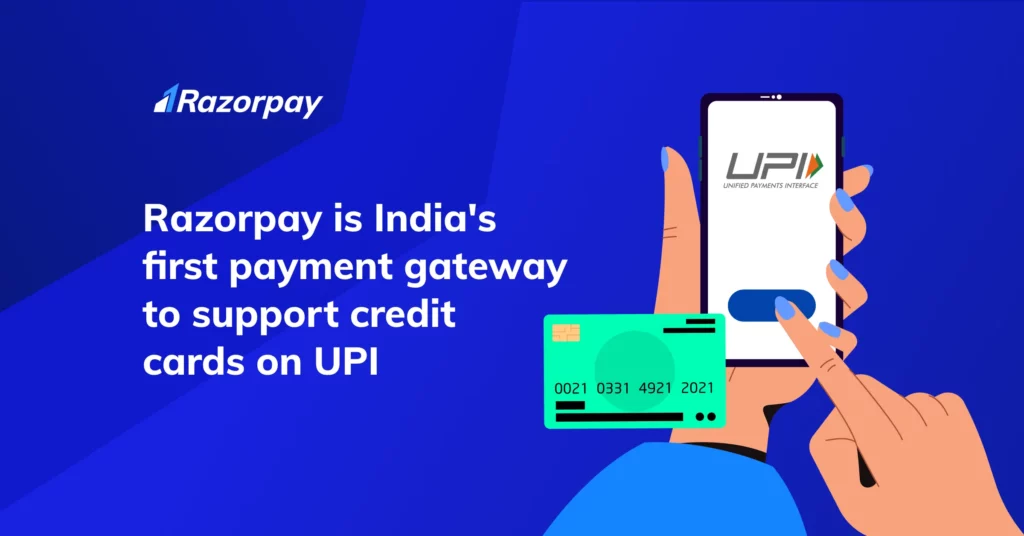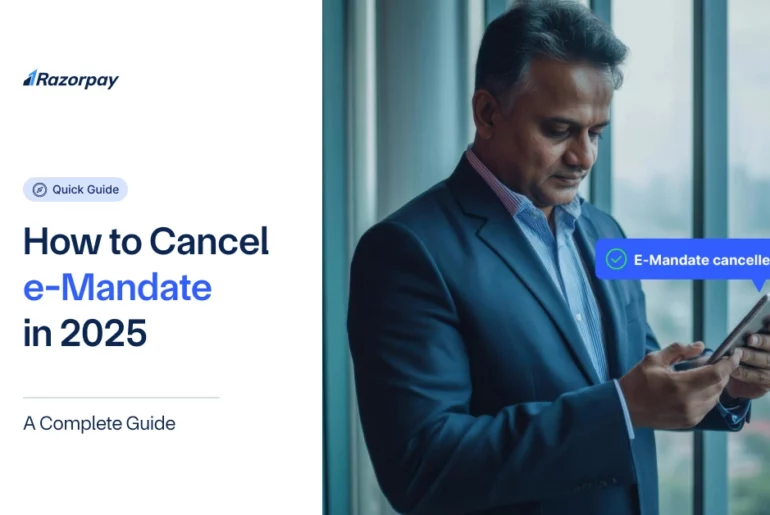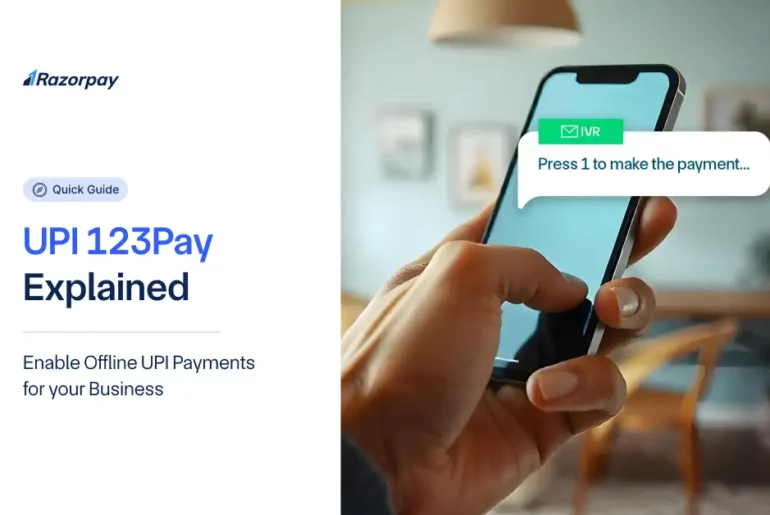What was once an innovation is today a way of life for millions of consumers. Over the last two and a half years, transactions on the UPI network have grown by a factor of 6 as digital payments have exploded in India.
We are now on the cusp of another revolution in the digital payments space. Earlier this year, the RBI announced that RuPay credit cards could be linked to the UPI platform, via BHIM (for now), and other popular apps like GPay and PhonePe in the coming months. It means that users can now start making payments via UPI apps using their credit cards, thus expanding the credit ecosystem to benefit businesses and customers alike.
We are proud to announce today that Razorpay has become the first payment gateway to support credit cards on UPI. Having been a pioneer in supporting UPI, we are now delighted to be part of a new era in UPI payments with this launch. This disruption has been possible in partnership with Axis Bank. Razorpay merchants can soon begin accepting credit card payments on UPI, with minimal changes to their existing setup. The needs of businesses and consumers are always evolving and we at Razorpay remain focused on fulfilling them.
Related Read: What is UPI and How it Works?
What is the NPCI & RBI’s innovation with UPI all about?
UPI has allowed customers to transact seamlessly on top of their bank accounts or debit cards. The decision to enable the linking of credit cards to UPI means that customers will now be able to make UPI payments on credit. The early users to take advantage of this will be Rupay credit card users, with cards from four issuing banks as of now – Indian Bank, Union Bank, Punjab National Bank and HDFC Bank.
There are close to 250 million UPI users and about 50 million users who have one or more credit cards in India. This is a welcome move from India’s financial regulator, to give users the best of both worlds – the seamless payment experience of UPI with the benefits of short-term credit and card rewards.
This decision undertaken by the NPCI and RBI is set to have positive implications for both consumers and merchants, where they can transact and accept payments via credit cards on UPI. For this enablement to bring in the impact, the readiness of any payment gateway infrastructure is essential. Under this context, Razorpay has taken the first step towards democratising credit card transactions on UPI for our merchants.
Shashank Kumar, MD & Co-founder, Razorpay
What is Razorpay doing about it?
At Razorpay, we have ensured that our Payment Gateway is ready to support credit card payments via UPI. So if you’re a Razorpay business, you will soon be able to offer your customers the convenience of making credit card payments via UPI. We are LIVE with a few merchants, including Zomato, ICICI Lombard & BlinkIt, and will go live with our extensive user base over the next couple of months.
(If you wish to sign up for our Early Access program, please fill this form out.)
All parts of the payment ecosystem – payment gateways, banks and third-party payment apps – need to play their part to ensure that any innovation can be implemented. As India’s leading full-stack and payments platform, we are delighted to be further strengthening digital payments and boosting India’s credit penetration.
This has the potential to change the way customers make payments in the next 2-3 years.Sanjeev Moghe, President & Head – Cards & Payments, Axis Bank
Related Read: How to Make Credit Card Payments Through NEFT?
What does this innovation mean for businesses?
Quite simply, businesses will now be able to offer their customers the convenience of paying on credit via India’s favourite digital payment method – UPI. This means easier credit card payments and happier customers. In addition, average order values tend to be higher when buyers spend using credit.
For business owners, the upfront cost of obtaining and maintaining a card-swiping machine will be a thing of the past. For merchants accepting online payments, UPI will transition from being a payment option which could be selected on the payment page to being the ‘payment page’ which will in turn house all debit and credit options.
We’re very excited to partner with Razorpay as the first payment gateway to go live with this innovation.
Pradyot Ghate, Vice President, Zomato
What does it mean for consumers?
Customers will now be able to enjoy the best of both worlds: the familiarity and ease of UPI with the flexibility and convenience of credit. The linking of credit cards to UPI means that customers don’t have to dip into their bank accounts for everyday transactions; they will be able to use credit to manage their cash flow without carrying their credit cards around.
In addition, the only payment method users now need to be familiar with is UPI.
We are excited to partner with Razorpay to promptly facilitate acceptance of Credit Card payments through UPI on their large merchant base, supplementing NPCI’s goal of helping all RuPay Credit Card users. This will enable users to transact seamlessly with merchants across India on credit rails in line with the government’s vision to expand the structured credit infrastructure in India. Active involvement from a leading ecosystem partner like Razorpay will accelerate go-to-market as it will enable credit cardholders to make transactions through UPI, thereby eliminating the need to carry a physical card. This development is of vital importance to the ecosystem as we look to expand our suite of services whilst boosting India’s credit penetration.
Nalin Bansal, Chief of Corporate and Fintech Relationships and Key Initiatives, NPCI
How will this impact the credit ecosystem?
The NPCI and RBI are looking to change the way Indians use credit, making it more accessible to all. While the credit card industry has grown steadily, only 6% of Indians have access to a credit card. The convenience of UPI, though, should help improve credit card penetration and expand the credit ecosystem.
We expect that the QR code in offline shops will eventually replace the card-swiping machine and will be the new card acceptance infrastructure.
This is how we foresee UPI impacting the credit ecosystem:
- Increased acceptance: QR codes (as per this 2022 BCG-PhonePe report) are already present in 10-12 times the number of stores as cards. Credit cards will now find greater acceptance.
- Ease of use: The ease of use that customers enjoy on UPI will now extend to credit cards. The ability to hold on to savings while paying for everyday transactions on credit will fuel growth in credit card transactions.
- Increased usage: With multiple new-age companies providing rewards for credit card payments, reward-hungry Indian customers may prefer the credit route.
- The flywheel effect: Average order values tend to be larger when customers spend using credit. To speed up the flywheel, the number of users having a credit option and the number of acceptance points need to expand. With credit card linkage to UPI, we expect a game-changing impact on both these inputs to the larger credit flywheel.
What does the future hold?
With this announcement by the RBI and NPCI, digital payments are expected to expand manifold. Linking credit cards to UPI is an innovative regulation. If executed well with enough incentives, we could see at least a five-fold jump in UPI volumes and see short-term credit reach the masses.
Want to accept credit card payments on UPI?


